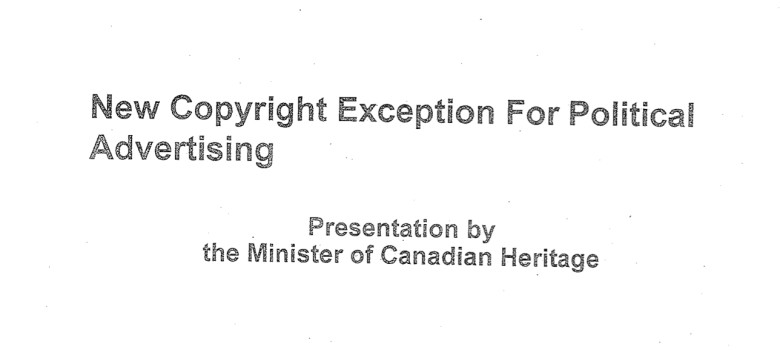Last night I posted on reports that the Canadian government is considering a new copyright exception for political advertising. While many have been harshly critical of the plans, I’ve noted that political speech is critically important and that copyright law should not be used to stifle it. My post argues that the law may already cover some of the uses and that if changes are needed, a better approach would be to adopt a fair use provision in Canada.
I have now obtained a copy of the document that was presented by the Minister of Canadian Heritage. The document is obviously consistent with the media reports, but provides significantly more detail and raises several additional questions and concerns.
First, the proposal is very narrow. It would only apply to political parties, politicians, candidates, and their agents. The creation of an exception that only allows a select few to benefit is not a provision that can be defended on freedom of political speech grounds. We are all entitled to exercise our political speech rights. A new exception that guards against copyright stifling such speech should apply to all.
Second, there are many exclusions from the content that qualifies for the exception. It does not apply to documentaries, fictional works, and most music or photographs. Moreover, it cannot be used for fundraising purposes and moral rights still apply (though most journalists may have waived their moral rights and corporations don’t hold such rights). Ironically, the government acknowledges that news reports that under a digital lock could not be circumvented under the provision, demonstrating how the overbroad digital lock rules contained in the last copyright bill negatively affect speech rights.
Third, the document anticipates the likely reactions, ranging from anger from news organizations to users seeking a broader approach. With respect to the news organization reaction, it is worth remembering that those organizations rely on copyright exceptions everyday. For example, the CBC ombuds last year rejected a complaint on the use of copyright works without permission on fair dealing grounds.
At this stage, it is unclear whether the proposal will be included in an omnibus budget bill. If it is, there will be legitimate criticisms about the process and the substance of a proposal that privileges the free speech rights of politicians and political parties over millions of Canadians.








Pingback: Proposed copyright change shows Conservatives running scared: LeBlanc
Pingback: IPPractice - Political Copyright
Why wouldn’t this be prohibited by Article 13 of the Rome Convention? To the extent it falls into the “short excerpt” of Article 15, isn’t that already picked up in the Copyright Act?
Pingback: Is Canada’s Broadcast Media Consortium Using Attack Ad Scandal to Push Copyright Political Agenda? | Jason Koblovsky
Last week I was asked by a documentary filmmaker whether she had to clear clips most of which were incidental and/or insubstantial in the film. This is a situation confronted by just about every doc filmmaker I know reflecting on the world we live in. Yet there is no certainty on the application of fair dealing here since commentary has yet to extend that far. Filmmakers unlike the CBC cannot avail themselves of the “news reporting” purpose. This is the lack of certainty that I think requires consideration not political advertising. This tells us everything we need to know of just exactly how the government will manipulate the law to suit its needs ahead of creators.
If we view this issue in terms of Copyright as providing economic rights to the owners, it seems to me that much of what the Conservatives are trying to do falls well within the ambit of fair dealing. The length of ads would necessarily suggest that only small excerpts would be used from the news stories. The effects would very clearly also be transformative. Nobody, however, is saying anything about moral rights as expressed in the Copyright Act. Distorting what someone produces in such a way as to bring that person into disrepute would certainly violate moral rights.
Pingback: Conservatives Propose to “Amend” Fair Dealing Not Replace It | Jason Koblovsky
I disagree. From my latest blog on the issue:
http://jkoblovsky.wordpress.com/2014/10/14/conservatives-propose-to-amend-fair-dealing-not-replace-it/
The media consortium went to air with the notion that the Conservatives were “stealing” (implicating an illegal act) news content, when they knew under law that wasn’t the case. The public was purposely mislead on the law by the media, using public discourse around attack ads as cover. That’s a much more serious issue that needs to be addressed ahead of an election where the electorate will be very cautious around what the law is in the next election due to the robocalls scandal. If we don’t have media acting independent of bias when it comes to reporting on the law in the next election, it will not be a free or fair vote.
Fair dealing in the Copyright Act is a permissive concept. Producing these ads using material from the media would in all likelihood easily fit into its definition. Requiring that the media show these same fair dealing ads is beyond the scope of copyright. Whatever the merit, it perhaps belongs in the Election Act or the Broadcasting Act, not the Copyright Act.
Pingback: Jobs, growth and long-term prosperity for the attack ad industry - Macleans.ca